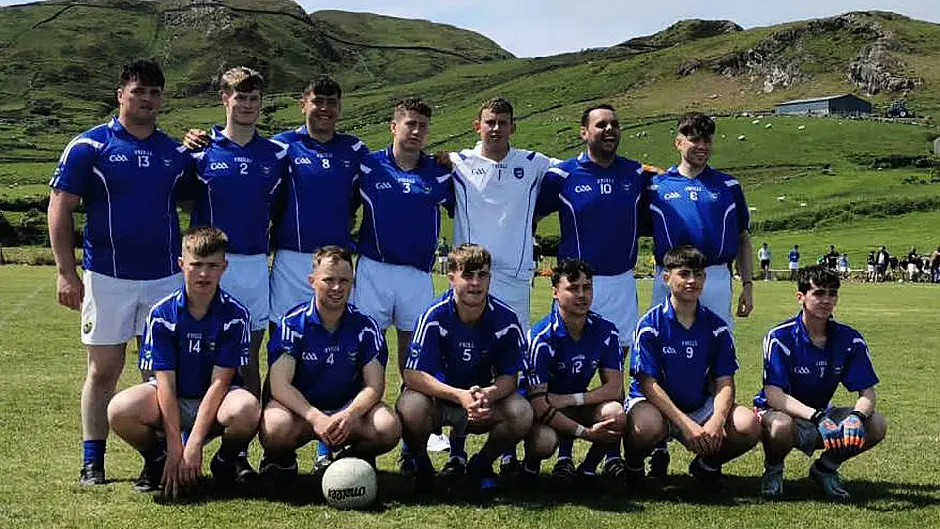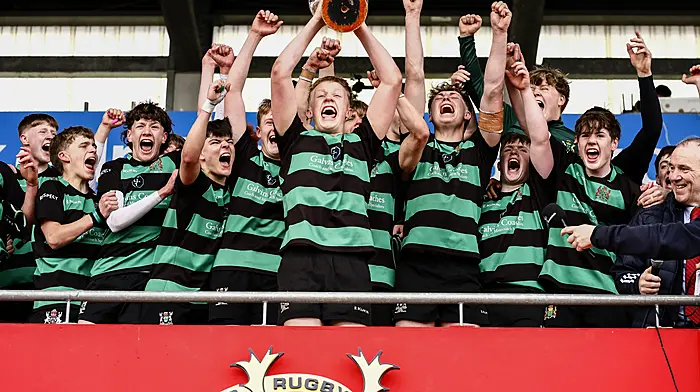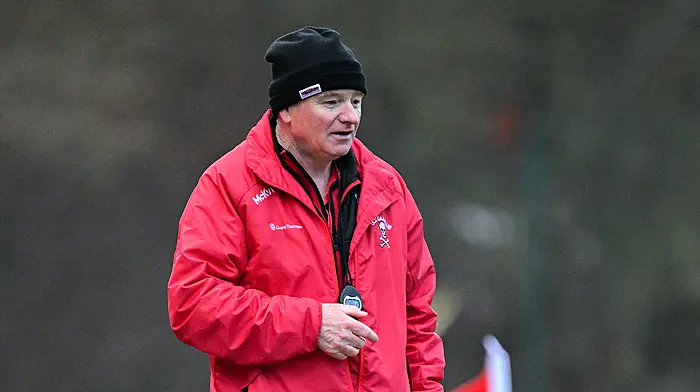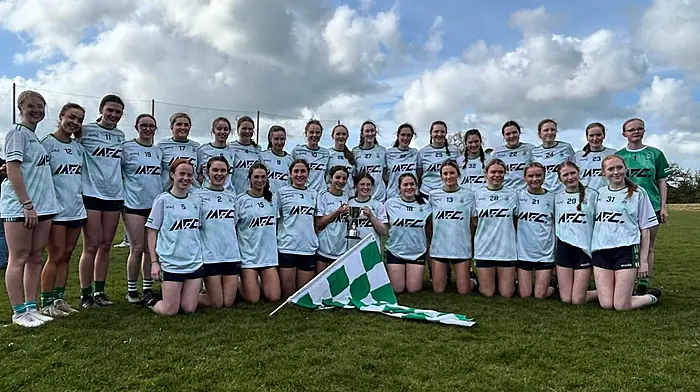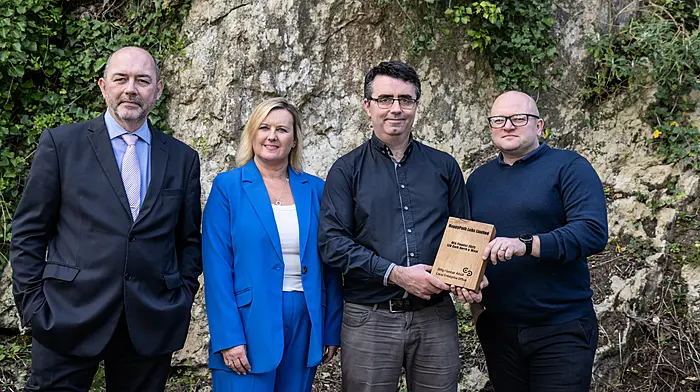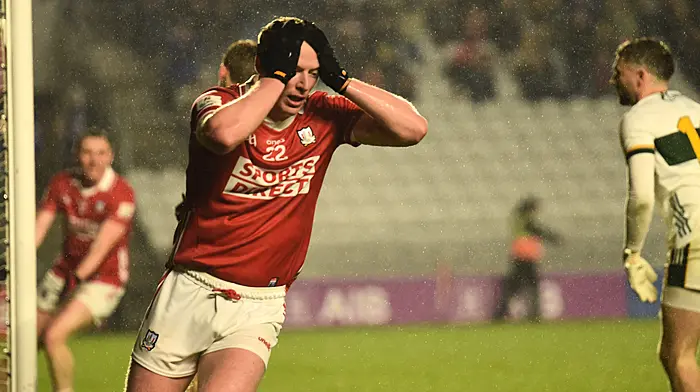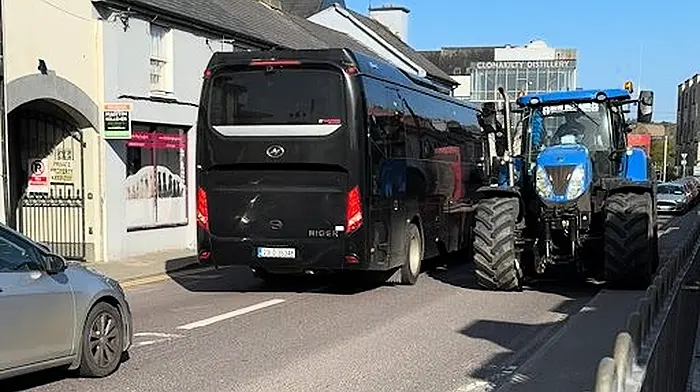The passionate football folk on Bere Island are determined to keep its GAA club’s doors open, and their hard work is paying off
OSCAR Daly loves island life and all its unique trappings.
‘Once it gets into your veins, it’s hard to leave,’ he says.
His connection to Bere Island stretches back to when he moved to the Beara peninsula with his family when he was 11 years old.
The Dalys swapped the vast emptiness of the Northern Territory in Australia – it was a three-day drive to the nearest big town, he remembers – for an intimate island at the entrance to Bantry Bay and only accessible by boat.
Oscar’s late father was a doctor so they moved around. Crosshaven. The UK. Down Under. Bere Island. The latter became home.
He is 36 years old now, and a full-time resident since 2018, living in the house his late parents, Pat and Ann, made their own. The island is home to Oscar, his partner Jenny O’Neill, and their three kids, Isla (6), Quinlan (4) and Lily (13 months).
 The Bere Island women's team that was in action at the All-Islands Football Championship included Joanne Sullivan, Lena Sullivan, Christina O'Sullivan, Laura Walsh, Michelagh Murphy, Ciara Hunt, Leanne Sullivan, Paula Sidley, Becky O'Sullivan, Aoife Walsh, Aimee Harrington and Andrea Collins.
The Bere Island women's team that was in action at the All-Islands Football Championship included Joanne Sullivan, Lena Sullivan, Christina O'Sullivan, Laura Walsh, Michelagh Murphy, Ciara Hunt, Leanne Sullivan, Paula Sidley, Becky O'Sullivan, Aoife Walsh, Aimee Harrington and Andrea Collins.‘There is a certain freedom and enjoyment living on the island that you wouldn’t get on the mainland,’ he explains.
‘We are close enough to the mainland to have the benefits of it, but we are cut off from it as well to have the benefits of island life. You can’t get a better place to raise kids.’
Central to life on Bere Island is its GAA club. An island of this size with its own affiliated GAA club is unique, and it’s at the heart of this tight-knit community, a central character in island life. Keeping the lights on in the remotest club in Cork has been a challenge in recent years, but it’s a fight these hardy islanders are intent on winning.
‘It’s vital our club keeps going,’ Oscar insists.
‘Look at the new Our Living Islands plan that was launched recently; the first island development plan from the government in the last 27 years. It’s all about getting people to move back to the islands or for new people to relocate. You need the clubs to be kept alive for people who want to move to the islands,’ he stresses.
‘The government and the GAA need to look at smaller communities like us and recognise the importance of having the club in an island community. There are 70 kids attending the Cúl Camp on the island this summer. There is the Bere Island Midsummer Run this Saturday, and that is a big thing. The parkrun every Saturday morning is run out of the club. You have the facility in itself. The clubhouse also works as the public toilets in the village.
‘If we lose our insurance all of that is gone and we have to close the gate – and that will impact so much more. The GAA needs to realise there is a lot more going on in smaller clubs than having to field championship teams.’
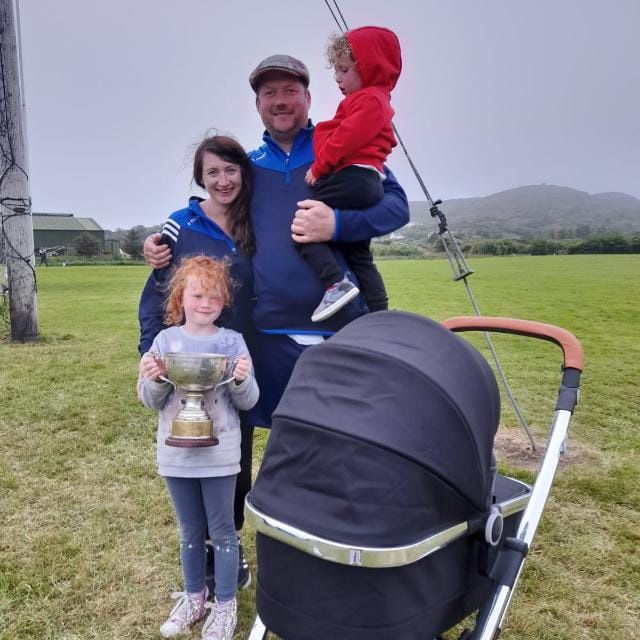 Oscar Daly with his partner Jenny O’Neill, and their three kids, Isla, Quinlan and Lily.
Oscar Daly with his partner Jenny O’Neill, and their three kids, Isla, Quinlan and Lily.Oscar’s referring to the GAA rule where clubs that fail to take part in any competition in two consecutive competition years ‘shall be deemed to be wound up’. No-one on Bere Island wants the club’s doors to close. It’s more than just a club. On New Year’s Eve 2022 Bere Island travelled to the mainland to play Castletownbere in a Beara junior C championship game; they lost, but they fielded a team. And the club goes on.
‘To keep the club going we have to play a championship game every year or 18 months, which puts us under savage pressure,’ Oscar explains.
‘It’s very hard to get 15 lads as most of the younger lads are now playing with Castletownbere (GAA Club). To be fair, you are playing in a good structure there and you can’t expect them to move back to us for three games a year.’
Bere Island’s lone game this year could be another clash against Castletownbere in a junior C game as part of the Bere Island Festival next month.
‘There is a junior B championship in Beara so we’re hoping they might send in their junior B team, and it would be the junior C game we need to keep the club going,’ he says.
Oscar feels the club is getting back on its feet following what he describes as a lost generation, which was just after Bere Island won the 2008 Beara junior B football championship. Between 2005 and ’11, the island was in four divisional finals, winning in ’08 against Garnish. That was the same year the clubhouse was built and the pitch redeveloped. Good times. Oscar was that team’s goalkeeper, it’s the position he made home. He has worked as a fisherman out of Castletownbere for almost two decades, and it’s not a job that lends itself to making training sessions. From March to September he would be out at sea for five or six days at a time, so he found slotting in between the posts was the best solution.
 Derek Harrington and Oscar Daly after Bere Island's win in 2022.
Derek Harrington and Oscar Daly after Bere Island's win in 2022.‘After that run of finals, there were no players coming up behind us so our team dwindled out. For the young lads coming up there was no team so they went to Town,’ he explains. Census figures highlight how the island’s population dropped from 216 in 2011 to 167 in 2016, a 22 percent fall. The club suffered too. Not enough bodies to field a team, but the All Islands Gaelic Football Tournament has helped turn the club’s fortunes around.
This is the ‘real All-Ireland’, as it’s known. It brings together nine islands from along the western seaboard – Bere Island and Whiddy Island from West Cork, and Arranmore, Inis Mór, Inish Meáin, Inis Oírr, Inishbofin, Inishturk and Clare Island. It’s a chance for the islands to take centre stage, for like-minded communities to come together for a weekend of fun and football. It’s a celebration of football and island life. Bere Island hosted the competition in 2022, its 23rd year – and won the men’s final, beating neighbours Whiddy in the decider, while the women’s team reached the semi-finals.
‘Derek Harrington and myself decided that to be competitive we would start from fresh,’ Oscar explains, reflecting on last year’s win that saw the boys in blue triumph.
‘The club here was struggling, young lads had moved on to play for Castletown so there were seven or eight lads, from 16 years of age to 25, playing for Town, and they all agreed to play. Then we added lads whose parents were from the island but were living on the mainland. We used all our resources, built a new team and won it here last year, which was amazing. It created a new identity because we were a bit lost as a club, but the resurgence of the Bere Island team has been great. Fellas felt what it was like to win for Bere Island.’
Saturday, May 21st, 2022 was an incredible day at the ‘Rec’, Bere Island's home pitch, and it injected life and energy back into the GAA club. All-Island champions. Even the sight of kids wearing Bere Island hoodies is a sign of progress.
The men’s and women’s teams travelled to Clare Island off the Mayo coast for the 2023 hosting in May, Oscar now in sole charge of the men’s team (the apprentice became the master after Derek Harrington moved to Germany), while Joanne Sullivan, his neighbour on the island, was over the women’s team. Bere Island men’s side, down on numbers with only 13 players making the trip and games are 11-a-side, went all the way to the final, but lost to host side Clare Island by two points in the final. Fatigue eventually caught up with the West Cork men who played four 20-minute games that day. ‘We ran out of legs,’ Oscar admits, while the women’s team just missed out on reaching the semi-final. Successive competitive years for both teams.
‘Ninety percent of the women’s team is made up of islanders who grew up here,’ Oscar says, before adding that there are a number of girls in the local school now playing with the Beara ladies team – and this highlights the commitment level of islanders as training is on the mainland. If they have to travel outside of ferry times, they use their own boats.
‘If you are going from Bere Island to, let’s say, Dunmanway for a match, it’s going to take you the day to do it. You have the extra travelling with getting to the mainland, then travelling to the game itself, and the same journey back home,’ Oscar explains. It’s the same for any after-school activities. His oldest girl, Isla, heads to the mainland three times a week, including swimming lessons in Kealkill.
‘If we leave here at 10am on a Saturday morning we are not back until half four, just for an hour of swimming,’ he highlights, but this is a way of life for the islanders. It takes commitment and it’s an island-wide effort to keep the GAA club alive, says Oscar, name-checking Jim Hanley, Robbie Hilliard, Brendan Murphy and Derek Harrington as four locals playing key roles, as well as thanking all the volunteers and sponsors who have helped along the way.
The future is brighter, Oscar adds optimistically.
‘There are roughly around 200 living on the island. There are 17 in the school but that will go up in the next few years because there are around a dozen kids under school age,’ he says, including his two youngest kids, and the hope is they’ll line out in Bere Island blue too. Everyone is playing their part to keep football alive on the island.

